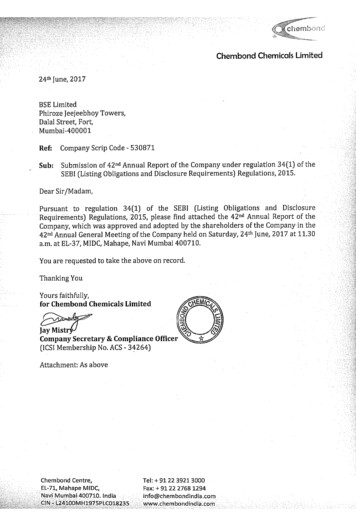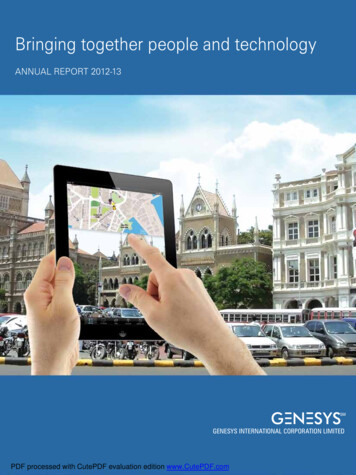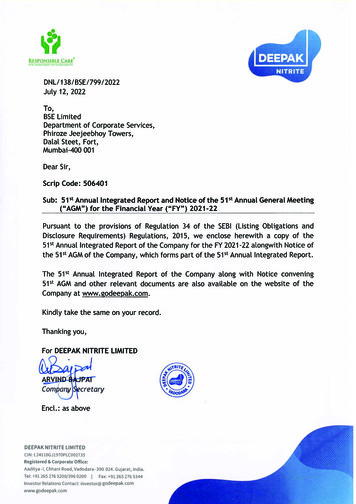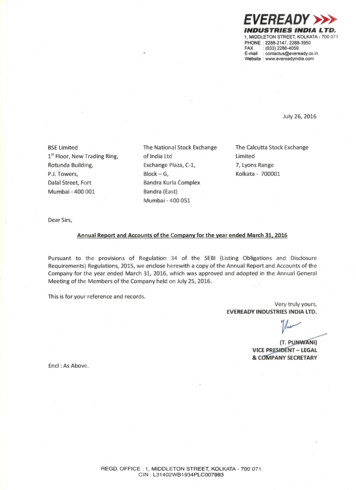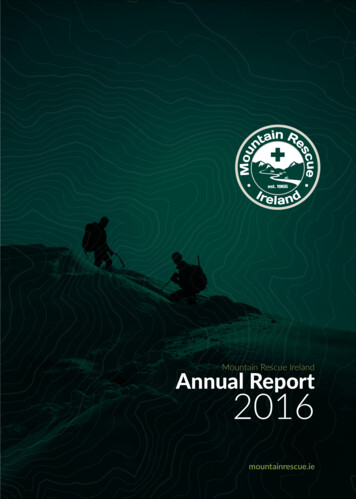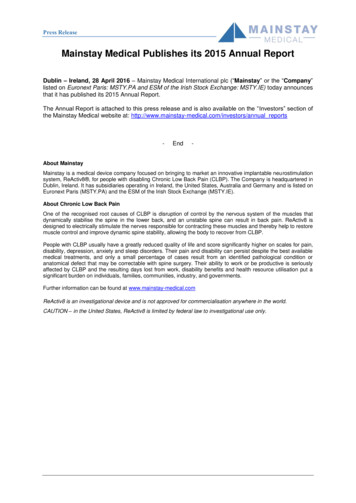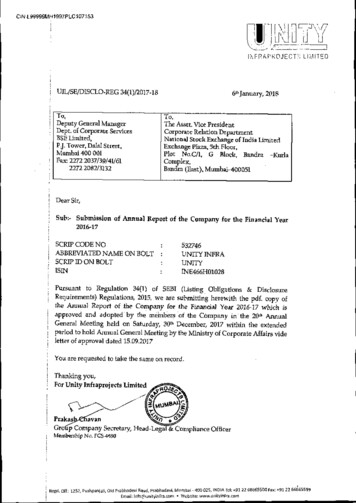
Transcription
ANNUAL REPORT2016-17
CONTENTSBoard of Directors and Corporate information:1Directors Report:5Management Discussion & Analysis:13Report on Corporate Governance:20Independent Auditor’s Report on Standalone Accounts:61Standalone Balance Sheet:70Standalone Profit & Loss Account:71Standalone Cash Flow Statement:72Notes to Standalone Accounts:73Independent Auditor’s Report on Consolidated Accounts:121Consolidated Balance Sheet,:126Consolidated Profit & Loss Account:127Consolidated Cash Flow Statement:128Notes to Consolidated Accounts:129Notice of Annual General Meeting:175Attendance Slip:181Proxy Form:183
CORPORATE INFORMATIONBOARD OF DIRECTORSChairman & Managing DirectorKishore K AvarsekarVice Chairman & Managing DirectorAbhijit K AvarsekarIndependent DirectorGirish GokhaleChaitanya JoshiDinesh JoshiWoman DirectorMrs.Vidya P AvarsekarGROUP COMPANY SECRETARY AND HEAD- LEGALPrakash ChavanCHIEF FINANCIAL OFFICERMadhav NadkarniCOMMITTEES OF THE BOARDAudit CommitteeDinesh Joshi: ChairmanGirish GokhaleChaitanya JoshiAbhijit K AvarsekarNomination & Remuneration CommitteeGirish Gokhale : ChairmanDinesh JoshiChaitanya JoshiStakeholders Relationship CommitteeGirish Gokhale : ChairmanKishore K AvarsekarAbhijit K AvarsekarCorporate Social Responsibility Committee\(upto 14.12.16)Girish Gokhale : ChairmanKishore K AvarsekarAbhijit K AvarsekarSTATUTORY AUDITORSM/s. C. B Chhajed & Co.Electric Mansion, 5th Floor,Appasaheb Marathe Marg,Mumbai - 400 025.SECRETARIAL AUDITORSM/s. Snehal Raikar & Co.Company Secretaries403, Gorai Disha CHS.,Plot No.: 50 L. T. RoadBorivali (West),Mumbai - 400 092REGISTERED & CORPORATE OFFICE1252, Pushpanjali Apartments,Old Prabhadevi Road,PrabhadeviMumbai - 400 025STOCK CODEBSE:532746NSE:UNITYREGISTRAR & SHARE TRANSFER AGENTLink Intime (India) Pvt. Ltd.C- 101, 247 Park,L B S Marg, Vikhroli (W),Mumbai- 400 083.INTERNAL AUDITORSM/s.H.Y.Pancha & Associates313, Janmabhoomi Chambers,W. H. Marg,Ballard Estate,Mumbai- 400 001ISININE466H01028CINL99999MH1997PLC107153LIST OF 18)19)20)21)22)23)State Bank of IndiaState Bank of PatialaState Bank of MysoreCorporation BankCentral Bank of IndiaIndian BankBank of BarodaAllahabad BankBank of MaharashtraDena BankUnion Bank of IndiaICICI Bank Ltd.IDBI Bank Ltd.Axis Bank Ltd.IndusInd BankING Vysya BankCatholic Syrian Bank Ltd.UCO BankIndian Overseas BankL & T Infrastructure Finance Co. Ltd.Abhyudaya Co-op. Bank Ltd,Standard Chartered BankDBS Bank Ltd.Annual Report 2016-17 1
CHAIRMAN'S STATEMENT Where public sector undertakings (PSUs) orgovernment departments have challenged thearbitration award, 75% of the award amount isto be paid to the contractor or concessionaireagainst a margin-free bank guarantee. All PSUs or departments issuing public contractsare being encouraged to set up ConciliationCommittees or Councils comprising independentsubject experts to ensure expeditious disposalof pending or new cases. Item-rate contracts can now be substituted byEPC or turnkey contracts. If this is done, thePSUs or departments are expected to adopt themodel EPC contract for construction works.Dear Shareholders, Ladies and GentlemenIn more ways than one, 2016-17 has been a worstyear for your Company. Let me share several reasonswhy this is so.The UPA-2 government the major problem that facedall construction companies was the legacy of stalledinfrastructure projects. The size was immense. Asan example, on January 31, 2016, there were 304stalled projects involving investments of Rs. 12,75,877crore.Such stalled projects completely destroyed thefinancial viability of private infrastructure andconstruction companies. These enterprises had usedsizeable working capital to mobilise labour and deployexpensive plant and machinery at various project sites.With the stalling and inordinate delays of theseprojects, the obvious consequences were massivecost over-runs and huge financial strains. Matterssignificantly worsened with government and quasigovernment execution agencies holding backpayments against contractors claims. Even whenindependent arbitrators in dispute resolution favouredconstruction companies, the executing agenciesinvariably delayed the payment process by appealingto a higher judiciary.Thus, all construction majors in the infrastructuresector faced a terrible situation of burgeoningreceivables on their balance sheets, inadequate cashinflows and huge interest payment on large workingcapital exposures. For a sample of listed constructioncompanies, interest cost as a percentage of totalincome soared from 6% in 2008-09 to above 13% in2015-16 — when the debt-equity ratio had bloatedto over 8. As such the business was not financiallysustainable.Thanks to the NDA government under Prime MinisterNarendra Modi has intervened to correct this glaringproblem.First, the Government of India (GoI) has managed tobreak the choke-hold of stalled projects, by givingfaster clearances and closely monitoring these at thehighest levels.Second, to revive the construction sector, the CabinetCommittee on Economic Affairs has approved a seriesof initiatives which ought to help in improving liquidityand introduce much needed reforms in the businessof contracting. Some of these include: 2The Arbitration and Conciliation (Amendment)Act, 2015, which facilitates faster and timebound decision making in the arbitration process. Unity Infraprojects LimitedThese initiatives ought to create a sound process ofdispute resolution and, by doing so, infuse badlyneeded liquidity in the construction sector.Third the Reserve Bank of India (RBI) has stepped into regulate Corporate Debt Restructuring ( CDR) andunsustainable levels of corporate debt. The newStrategic Debt Restructuring (SDR) and the Schemefor Sustainable Restructuring of Stressed Assets (orS4A) introduced in 2016 should give relief to theconstruction majors and create the liquidity neededto bid for new projects.Fourth, the GoI has clearly focused on pushing forsignificant infrastructure development. In the UnionBudget of 2016-17 the outlay on infrastructure wassubstantially stepped up. The Union Budget 2017-18boosted it further by 10% to Rs. 3,96,135 crore, withroads, bridges and railways seeing higher allocations.Fifth, let me now share with you what your Companyhas done regarding the CDR scheme. The Companyhad availed credit facilities (“Facilities”) for workingcapital requirement as well as for hiring constructionequipment for its various projects. The debtobligations of the Company were restructured underCorporate Debt Restructuring (“CDR”) mechanism onthe terms and conditions set out in the MasterRestructuring Agreement dated 26th December, 2014executed amongst SBI (as the Monitoring Institution),the Lenders and the Company (“CDR MRA”). ThePrincipal Moratorium was for 27th months from thecut-off date i.e. 1st January, 2014.Despite availing the restructuring of the Facilities underthe CDR mechanism, the Company was facing liquidityissues and challenges in debt servicing due to interalia slower than envisaged recovery in the economyand infrastructure sector and increased interest costfor the Company due to increase in working capitalrequirement and non-realization of claims/receivables.This resulted in a gap of cash-flow timing mismatchbetween claims realization (including interest) and
Chairman's Statementdebts serving. If such gap left unaddressed, theCompany will face challenges in the execution of itsorder book and also in serving of its debt. Additionalworking capital support sanctioned by Lenders werenot disbursed.Accordingly, in order to bring the aforementioned cashflow timing mismatch, the lenders deliberated varioussolutions to address the aforementioned liquidity issueand recommended the Scheme for Strategic DebtRestructuring introduced by the Reserve Bank of India(“RBI”) pursuant to circulars dated February 25,2016.The Lenders in their Joint Lender’s Forum meeting(“JLF”) held on 28th March, 2016 deliberated on thevarious options, but could not agree with therecommendation of Monitoring Committee forimplementation of Strategic Debt Restructuring.Sixth, during the period under review, the Turnoverof the Company on a standalone basis stood at Rs.247.08 Crore, as compared to Rs. 381.40 Crore duringthe previous year. The Company posted a Net Lossafter Tax of Rs.1113.20 Crore during the year ended31st March, 2017, as against a Net Loss after Tax ofRs. 540.37 Crore during the previous year ended 31stMarch, 2016.Seventh, the option left with the Company to explorethe opportunities for strategic investor as well as tocomplete the projects which were near to completionto avoid further encashment of bank guarantees ortermination of contract. The Company and themanagement is hopeful that it will come over thesaid situation.Eighth, bureaucrats are still not taking timely decisionsfor fear of being charged with corruption. For thesame reason some do not act expeditiously on evenorders coming from the Union Cabinet. Theadministration of contracts by government agenciesis stilltardy, suffering from excessive dissecting tofind reasons why not to act. And when action isforthcoming, it is often in violation of the contractualconditions. Contract administration needs reform. Thisneeds support from the central and state governmentsif these are to be executed on time and with leastcost overruns. The banking sector is in a crisis of itsown. The new Banking Ordinance and the latest RBIregulatory order in the wake of the ordinance areencouraging. But the confidence of bankers to makethem work is still to be tested. They too are fearfulof being charged with corruption even though theOrdinance and the RBI orders gives them adequateteeth to take tough decisions. They need to be leftalone and operate without the fear to makecommercial decisions.It is under these circumstances that we have to moveforward to deliver performance. The year 2017-18,therefore, will be a year of consolidation and layingthe foundation for a growth path. The GoI’sdetermination to remove the obstacles to economicgrowth is encouraging. Let us pray for a burst ofconsistent growth that our country needs, growthdriven by the government’s purposeful drive to buildinfrastructure.Thank you for your support.Yours,Kishore K AvarsekarChairman & Managing DirectorDIN:00016902Annual Report 2016-17 3
VICE-CHAIRMAN’S STATEMENTDear Shareholders,Let me start by sharing my views on the challenges theinfrastructure industry is facing today before penningvarious developments. The slowdown in constructionactivities has adversely affected Engineering, Procurementand Construction (EPC) companies across India. Severalunforeseen issues impacted projects at various stagesof their life cycle from planning to operations, whichhave made several of them unviable. The sector is plaguedwith significant cost overruns, regulatory bottlenecks andaggressive bidding positions taken by a few market playersresulting in financial losses. Another important elementis the massive build-up of claims that are receivable fromvarious government entities. These are on account ofseveral factors, such as change of scope of work (quantityvariation or extra items), idling of resources like manpowerand overheads, compensation beyond the originalstipulated contract period, change in statute and loss ofopportunity. The entire claims resolution mechanism hasbeen substantially delayed and, consequently, blockedup large amounts of cash severely affecting liquidity acrossthe value chain.In a backdrop of global uncertainty and slowingeconomic growth, India was a bright spot in 20162017 with robust macroeconomic fundamentals. Theyear was marked by two major domestic policydevelopments: passage of the Constitutionalamendment which paved way for implementing thetransformational Goods and Services Tax (GST), andthe action to demonetise the Rs. 500 and Rs. 1,000bank notes in the country.The GST will create a common Indian market, improvetax compliance and governance, and boost investmentand growth. It is also a bold new experiment in thegovernance of India’s cooperative federalism. The billto implement GST has been passed in the Parliamentand the country is poised to move to a GST regimefrom the second quarter of 2017-2018The national income data published by the CentralStatistics Office (CSO) does not suggest any significantreduction in growth in the third quarter of 2016-2017,which coincided with demonetisation. The third quartertends to be muted. In 2015-2016, the growth rate ofreal gross value added (GVA) in Q2 was 8.4%; whilein Q3 it was 7%, or a sequential drop of 1.4 percentagepoints. In 2016-2017, GVA growth in Q2 was 6.7%,and in Q3 it was 6.6%. Thus, despite the effects ofdemonetisation for much of Q3 financial year 2017,the negative effect — as reported by the CSO — hasbeen only 10 basis points.Slow decision making due to regulatory issues,investigation, and judicial intervention has led to situation,where thousands of crores have got stuck. Companiesthat have increased their overheads in view of anticipated4 Unity Infraprojects Limitedgovernment projects are in losses. This situation couldlead to some of the construction companies getting wipedout.There are around 100 infrastructure companies thatare into project development. Of the 45 core companies,20 are currently in CDR. They are unable to bid anywaybecause they have exhausted all their resources andbanks have reached exposure limit. The sector needscorrective measures, if we want to build infrastructure.Infrastructure companies that are in CDR or havestressed financial condition are finding it difficult toget credit. While government agencies need to becautious, putting a blanket ban on them would not bepositive for the sector’s development. We needsystemic changes to ensure that companies can takeon new projects and have credit available.Debt-ridden infrastructure companies could find itdifficult to get back on the road to recovery, even ifthey’re trying to fix finances. That’s because companiesgoing through the corporate debt restructuring or CDRprocess have been barred from applying for contractsfloated by some government agenciesThe debt obligations of the Company were restructuredunder Corporate Debt Restructuring (“CDR”)mechanism. Moratorium period of CDR Package hasexpired on 31st March, 2016 and during the said periodthere was no progress seen for revival of the Company.Lenders opposed for Strategic Debt Restructuring ( SDR).The management of the Company has been trying itslevel best to save Bank Guarantees by giving balancework of on-going project on B2B basis. The Companyposted a Net Loss after Tax of Rs.1113.20 Crore duringthe year ended 31st March, 2017. With accumulatedlosses of Rs. 1113.20 crores at the end of the financialyear, resulting in erosion of total net worth.The Company is exploring several options forovercoming the liquidity crisis. During the period underreview, the Company focused on realizing long pendingreceivables arbitration awards and retention moneys.With these thoughts and feelings, I would like to takethis opportunity to wholeheartedly thank the Centraland State Governments, Shareholders, Investors,Bankers, Financial Institutions, Regulators, Suppliers,Media and Customers for their consistent and constantsupport. I wish to express appreciation to my colleagueson the Board and our employees for their thoughtLeadership, dedication and commitment. I am indeedgrateful to you all for your cooperation and the trustyou have reposed in us.With warm and very best regards,Abhijit K AvarsekarVice Chairman and Managing DirectorDIN: 00047067
DIRECTORS’ REPORT3.DIVIDEND:Your Company has restructured its debt underthe Scheme for Corporate Debt Restructuring(“CDR Package”) and therefore, it is necessaryto conserve and optimise use of resources toimprove the health of the Company. Hence, yourDirectors have not recommended any dividendfor the financial year ended March 31, 2017.4.OPERATIONS:Dear Stakeholders,The Board of Directors have pleasure in presentingtheir 20th Annual Report together with the AuditedAccounts of the Company for the year ended 31March, 2017.1.FINANCIAL PERFORMANCE:During the period under review, the Turnover ofthe Company on a standalone basis stood at Rs.247.08 Crore, as compared to Rs. 381.40 Croreduring the previous year. The Company posteda Net Loss after Tax of Rs.1113.20 Crore duringthe year ended 31st March, 2017, as against aNet Loss after Tax of Rs. 540.37 Crore duringthe previous year ended 31st March, 2016.Moratorium period of CDR Package has expiredon 31st March, 2016 and during the said periodthere was no progress seen for revival of theCompany. Lenders opposed for Strategic DebtRestruucturing (SDR). The management of theCompany has been trying its level best to saveBank Guarantees by giving balance work of ongoing project on B2B basis.On a Consolidated basis, the Turnover of UnityGroup stood at Rs. 259.12 Crore as comparedto Rs. 480 Crore for the previous year. The Groupposted a Net Loss after Tax of Rs. 1170 Croreduring the year ended 31st March, 2017, asagainst a Net Loss after Tax of Rs. 557 Croreduring the previous year ended 31st March, 2016.The financial closure of three projects were doneby the Company. The documents for the samewere executed in the year 2013-14. But,subsequent to the execution of the documents,some of the lenders of Consortium of Bank hadbacked out from the financial closure. No newlender had shown interest in the project. One ofthe Road project has been foreclosed by theNHAI and other one had terminated. In order tosave BG given by the Company, the managementhad written to the Client to replace theConcessioner.The Order book as on 31st March, 2017 stood atRs. 608.89 Crore.2.EROSION OF NETWORTH:With accumulated losses of Rs. 1113.20 croresat the end of the financial year, resulting inerosion of total net worth. The Board hasreviewed the causes for such erosion and thereasons amongst others which adverselyaffected the performance of the Companywere:(a) Delay in execution of Project, necessityto hire local workmen, adverse operating andfinancial leverage and delay in sanction anddisbursement of required Project Loan,termination of contract and black listing, whichresulted in huge over-run and caused nonachievement of performance and profitability andthereby losses.The Board after considering the various stepsimplemented and/or to be undertaken forimprovement of performance of the Company isconfident/optimistic that the Company would beable to implement effective measures in normalcourse of business to revive the operations ofthe Company. Accordingly, the financialstatements for the Financial Year 2016-17 hasbeen prepared on a going concern basis.Under the CDR Package, further funds in theform of equity/preference shares/unsecured loanetc., had infused by the promoters and also theCompany is seeking potential investmentsources.5.CDR IMPLEMENTATION:The Company had availed credit facilities(“Facilities”) for working capital requirement aswell as for hiring construction equipments forits various projects. The debt obligations of theCompany were restructured under CorporateDebt Restructuring (“CDR”) mechanism on theterms and conditions set out in the MasterRestructuring Agreement dated 26th December,2014 executed amongst SBI (as the MonitoringInstitution), the Lenders and the Company (“CDRMRA”). The Principal Moratorium was for 27thmonths from the cut-off date i.e. 1st January,2014.Despite availing the restructuring of the Facilitiesunder the CDR mechanism, the Company wasfacing liquidity issues and challenges in debtAnnual Report 2016-17 5
Directors’ Reportservicing due to inter alia slower than envisagedrecovery in the economy and infrastructuresector and increased interest cost for theCompany due to increase in working capitalrequirement and non-realization of claims/receivables. This resulted in a gap of cash-flowtiming mismatch between claims realization(including interest) and debts serving If such gapleft unaddressed, the Company will facechallenges in the execution of its order bookand also in serving of its debt. Additional workingcapital support sanctioned by Lenders were notdisbursed.with Shcedule V of the SEBI (Listing Obligations& Disclosure Requirements) Regulations, 2015,Management’s Discussion and Analysis is setout in a separate section forming part of theAnnual Report as Annexure A.8.During the year under review, the followingchanges have taken place with respect toSubsidiary Companies and Associate Companies:As on March 10, 2017 your Company has 8 directSubsidiaries, 8 step down Subsidiaries and 11Associate Companies. There has been nomaterial change in the nature of the business ofthe Company and its subsidiaries.Accordingly, in order to bring the aforementionedcashflow timing mismatch, the lendersdeleibarated various solutions to address theaforementioned liquidity issue and recommendedthe Scheme for Strategic Debt Restructuringintroduced by the Reserve Bank of India (“RBI”)pursuant to circulars dated February 25, 2016.Chomu Mahala Toll Road Private Limited,asubsidiary company ceased to be a subsidiaryof Unity Infraproject Limited w.e.f. 17.03.2017due to allotment of shares to Lenders underSDR Scheme.The Lenders in their Joint Lender’s ForumMeeting (“JLF”) held on 28 th March, 2016deliberated on the various options, but could notagree with the recommendation of MonitoringCommiittee for implimentation of Strategic DebtRestructing.In accordance with third proviso of Section 136(1)of the Companies Act, 2013, the Annual Reportof the Company, containing there in itsstandalone and the consolidated financialstatements has been placed on the website ofthe Company, www.unityinfra.com.The option left with the Monetoring Committeeas well as the Company to explore theopportunties for strategic investor as well as tocomplete the projects which were near tocompletion to avoid further encashment of bankguarantees or termination of contract. TheCompany and the management is hopeful that itwill come over the said situation.6.The Company has not issued any shares withdifferential voting rights and hence noinformation as per provisions of Section 43(a)(ii)of the Act read with Rule 4(4) of the Companies(Share Capital and Debenture) Rules, 2014 isfurnished.7.MANAGEMENT DISCUSSION AND ANALYSIS:In terms of the provisions of Regulation 34 read6A statement containing salient features of thefinancial statements of these companies asrequired to be provided under section129(3) ofthe Act, are enclosed herewith in the specifiedform, as Annexure BB. Accordingly, this annualreport does not contain the reports and otherstatements of the subsidiary companies. Anymember intends to have a certified copy of theBalance Sheet and other financial statements ofthese subsidiaries may write to the CompanySecretary. These documents are available forinspection during business hours at theregistered office of the Company and that ofthe respective subsidiary companies.SHARE CAPITAL:During the period under review there is nochange in the Authorised Capital of the Company.The Authorised Share Capital is Rs. 35,00,00,000/and Paid-up Capital is Rs 24,17,53,604/-.The equity shares have been listed and beingtraded on both the stock exchanges i.e. NationalStock Exchange of India Limited (NSE) and BSELimited (BSE). Unity Infraprojects LimitedSUBSIDIARIESANDCONSOLIDATEDFINANCIAL STATEMENTS:9.DIRECTORS/ KEY MANAGERIAL PERSONNEL(KMP):7.1 Appointments by rotationIn accordance with the provisions of theCompanies Act, 2013 read with the Articles ofAssociation of the Company and Regulation 36(3)of SEBI (Listing Obligations and DisclosureRequirements) Regulations, 2015 Mrs. Vidya PAvarsekar, Director of the Company will retiresby rotation at this meeting and being eligible,your Board recommends her re-appointment.
Directors’ ReportDetails of the director seeking re-appointmentat this meeting has been given in the notice ofthe meeting.7.2(b)Key Managerial Personnel:Mr. Kishore K Avarsekar Chairman and ManagingDirectors, Mr. Abhijit K. Avarsekar, Vice Chairmanand Managing Director & Chief Executive Officer(CEO), Mr. Madhav G. Nadkarni Chief FinancialOfficer and Mr. Prakash B. Chavan, GroupCompany Secretary and Heal Legal are KeyManagerial Personnel of the Company.10.11.MEETING OF THE BOARD :Five (5) Board Meetings were held during thefinancial year ended 31st March, 2017. Thedetails of the Board Meetings with regard totheir dates and attendance of each of theDirectors there at have been provided in theCorporate Governance Report.An exclusive meeting of the IndependentDirectors of the Company was held on 10thFebruary, 2017 which was attended by all theIndependent Directors. They have reviewed theperformance of the non-independent directorsand the Board as a whole, performance ofchairperson and quality of information to theBoard as provided under Schedule IV of theCompanies Act, 2013.12.Knowledge and SkillsProfessional conductDuties, Role and functionsEvaluating Business Opportunity andanalysis of Risk Reward Scenarios Key set Goals/KRA and achievements Professional Conduct and Integrity Sharing of Information with the Board14.VIGIL MECHANISM:Pursuant to the provisions of Section 177(9) &(10) of the Companies Act, 2013 and the SEBI(ListingObligationsandDisclosureRequirements) Regulations, 2015, a VigilMechanism or ‘Whistle Blower Policy’ fordirectors, employees and other stakeholders toreport genuine concerns has been established.The same is also uploaded on the website ofthe Company.15.INTERNAL CONTROL SYSTEMS:The Company’s internal control procedures whichincludes internal financial controls, ensurecompliances with various policies, practices andstatutes and keeping in view the organisation’space of growth and increasing complexity ofoperations. The internal auditors team carriesout extensive audits throughout the year acrossall locations and across all functional areas andsubmits its reports to the Audit Committee ofthe Board of Directors.The following were the Evaluation Criteria: AUDIT COMMITTEE:The Audit Committee consists of all IndependentDirectors with Mr. Dinesh Joshi as Chairman,Mr. Girish Gokhale, Mr. Chaitanya Joshi and Mr.Abhijit K Avarsekar Vice Chairman andManagiong Director as members. TheCommittee inter alia reviews the Internal ControlSystem, Reports of Internal Auditors andCompliance of various regulations. TheCommittee also reviews at length the financialstatements before they are placed before theBoard of Directors.Pursuant to the provisions of the Companies Act,2013 and the SEBI (Listing Obligations andDisclosure Requirements) Regulations, 2015, theBoard has carried out the annual performanceevaluation of the Directors individually as wellas evaluation of the working of the Board and ofthe Committees of the Board, by way ofindividual and collective feedback from Directors.For Independent Directors:Performance as Team Leader/Members13.PERFORMANCE EVALUATION:(a) The Directors expressed their satisfaction withthe evaluation process.INDEPENDENT DIRECTORS:The Independent Directors of the Company havegiven the declaration to the Company that theymeet the criteria of independence as providedin of Section 149(6) of the Companies Act, 2013and Regulation 25 of SEBI (Listing Obligations &Disclosure Requirements) Regulations, 2015 ofthe Listing Agreement with the Stock Exchanges.For Executive Directors:16.CORPORATE SOCIAL RESPONSIBILITY:Corporate Social Responsibility (CSR) is not anew term for UNITY. K K Group of Companieshas been carrying out CSR activities since 2010and focusing on three major areas – Education,Annual Report 2016-17 7
Directors’ ReportHealthcare and Rural Development.Pursuant tothe provisions of section 135 of the CompaniesAct, 2013, the Corporate Social ResponsibilityCommittee was constituted by the Board at itsmeeting held on 29th May, 2014 since theCompany fulfilled the conditions stipulated in subsection(1) of section 135. Since financial year2014, the Company has been facing liquiditycrunch on account of various factors viz.significant delays in project execution due to landacquisition, legal issues and regulatorybottlenecks, shortage of funds/liquidity due todelayed realization of receivables in excess ofsix months, long term Investment/Advances toReal Estate/ and BOT subsidiaries and part ofinventory has become absolute on account ofthe projects getting unduly delayed. During thefinancial year 2013-14 the Company was referredto CDR Cell and CDR Package was approved on26.12.2014 for revival of the Company.In compliance with requirements of Section 135of the Companies Act, 2013, the Company haslaid down a CSR Policy. The composition of theCommittee, contents of CSR Policy and reporton CSR activities carried out during the financialyear ended 31st March, 2017 (till 14th December,2016) in the format prescribed under Rule 9 ofthe Companies (Accounts) Rules, 2014 isannexed herewith as Annexure CC.Requirements) Regulations, 2015 are providedin the Corporate Governance Report.18.Related party transactions that were entered intoduring the financial year were on arm’s lengthbasis and were in ordinary course of businessand were within the limits and terms andconditions approved by the Shareholders of theCompany in the Extra-ordinary General Meetingheld on 28 th February, 2015. There are nomaterially significant related party transactionsmade by the Company which may have potentialconflict with the interest of the Company. Thepolicy on Related Party Transactions as approvedby the Board of Directors is available on theCompany’s website i.e.www.unityinfra.comPrior omnibus approval of the Audit Committeeis also sought for transactions which are of aforeseen and repetitive nature.The related party transactions are entered intobased on considerations of various businessexigencies such as synergy in operations,profitability, legal requirements, liquidity,res
Third the Reserve Bank of India (RBI) has stepped in to regulate Corporate Debt Restructuring ( CDR) and unsustainable levels of corporate debt. The new Strategic Debt Restructuring (SDR) and the Scheme for Sustainable Restructuring of Stressed Assets (or S4A) introduced in 2016 should give relief to the construction majors and create the .

